The Best Cannabis ERP Software
Cannabis ERP systems help cultivators, processors, distributors, and retailers streamline their business. We’ve reviewed the top systems that offer distinct features like cultivation management and compliance reporting.
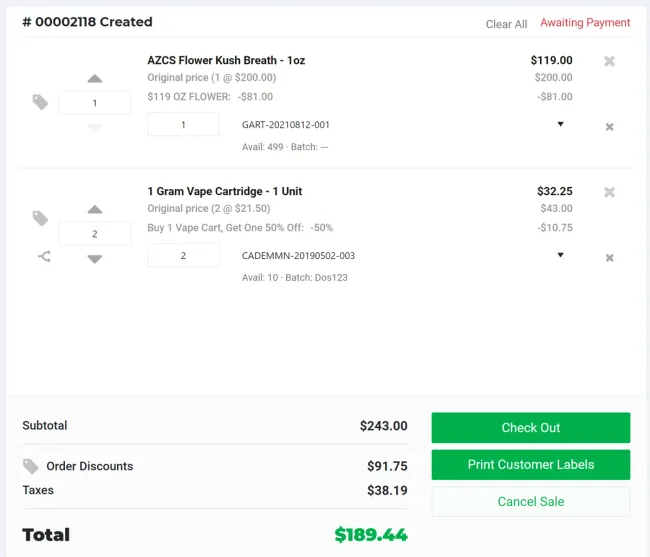
- Uses RFID to offer advanced plant monitoring
- Has automated state regulation alerts to help meet compliance
- Offers several different chart types for reporting
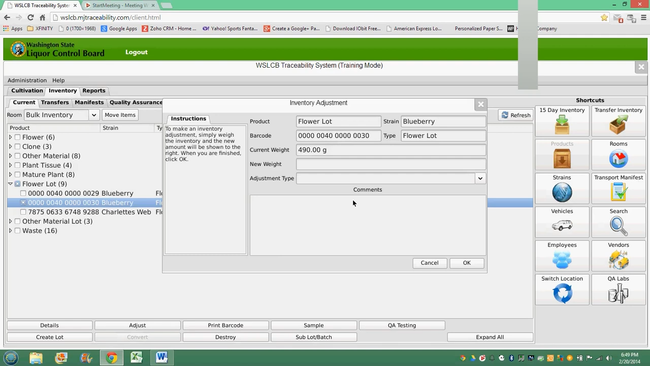
- Integration with accounting systems
- Offers over 100 customizable reports
- Advanced seed-to-sale tracking
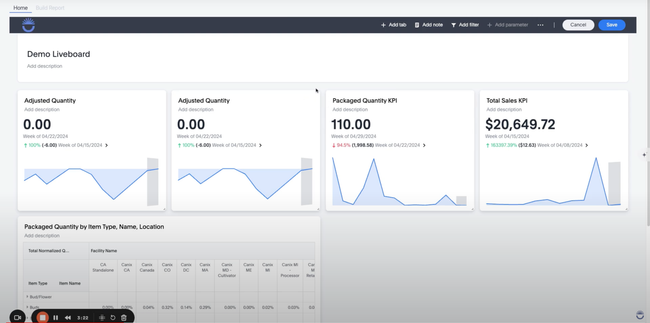
- Customizable reporting
- Hardware integrations (RFID)
- Has Metrc integration and compliance tools
Here’s a rundown of the best systems based on our internal review process.
- Flourish: Best Seed-to-Sale Tracking
- BioTrack: Best Compliance Management
- Canix: Best for Growing Companies
- SilverLeaf ERP: Best Track and Trace Module
- 365 Cannabis: Versatile Business Management
- Royal 4 WISECannabis: Best Warehouse Management
- Viridian Sciences: Best Cultivation Optimization
- QuantumLeaf: Strong Grow Operation Support
Flourish - Best Seed-to-Sale Tracking
Flourish has a seed-to-sale tracking system designed to manage and monitor every stage of the cannabis supply chain, from cultivation and processing to distribution and retail, ensuring operational efficiency and regulatory compliance.
With Flourish, your cultivation team can track each plant’s growth, health, and environmental conditions using RFID technology. If any metrics fall outside your set optimal ranges, the system will send alerts, allowing prompt corrective actions. The software also syncs with scanners, scales, and portals to log all records in the growhouse.
Once your employees harvest the plants, the manufacturing team can manage the extraction and product formulation processes. Flourish calculates the cost of goods sold for each product batch, aiding in pricing and profitability analysis. The distribution team can process orders, coordinate deliveries with optimized routes, and ensure all compliance documentation is in order. Real-time tracking can help you monitor shipments and give your customers accurate delivery times.
BioTrack - Best Compliance Management
BioTrack has strong compliance management features, making it a go-to choice for cannabis businesses navigating complex regulatory landscapes. It includes traceability from cultivation and harvest, through QA testing, and the final sale. The system records all of this info in a secure traceability portal that allows regulatory agencies and law enforcement to see where inventory is in real time.
The software offers customizable reporting capabilities essential for maintaining compliance with the Department of Agriculture, DEA, and FDA regulations. You can generate inventory audits, testing results, and financial reports. You can even create custom ones with the drag-and-drop report builder. So whether it’s for local or federal adherence, you can give them the info they need.
BioTrack has a modular structure, so you only have to implement what you need. These modules encompass the entire seed-to-sale process, from cultivation, manufacturing, and dispensing. Pricing starts at $200/month, but final costs depend on the size of your business and your desired modules.
Canix - Best for Growing Companies
Canix offers an efficient seed-to-sale tracking system. It’s designed for cannabis businesses seeking a streamlined approach to tracking their inventory throughout the product lifecycle.
Canix offers a blend of cultivation management, manufacturing, and distribution tools, making it a good choice for businesses seeking a comprehensive view of their operations. Its ability to manage large volumes of data and provide actionable insights makes Canix a top contender for businesses focusing on efficiency and growth.
SilverLeaf ERP - Best Track and Trace Module
SilverLeaf ERP connects your entire operation—cultivation, processing, inventory, and shipping—directly with your state’s track-and-trace system. This means less manual entry and fewer mistakes while keeping you audit-ready.
You can configure compliance rules by jurisdiction: in Metrc states, it works with pre-assigned plant and package tags; in BioTrack states, it assigns tags at the time of the transaction. That flexibility is key for multi-state operators—it lets teams follow local laws without managing separate workflows, reducing training time and operational friction.
The track and trace module automatically provides full visibility into every product using a cannabis business central (CBC) tags list, recording key lifecycle events like:
- Where it was received or grown
- How it was processed or converted
- Where it was stored
- To whom it was sold or transferred
This gives you full chain-of-custody visibility from seed to sale. Your team can then quickly respond to compliance audits and external inspections without scrambling for records. SilverLeaf is built on the Microsoft Dynamics 365 Business Central ERP platform and starts at $179/user/month plus implementation.
365 Cannabis - Versatile Business Management
365 Cannabis is an ERP solution that caters to various aspects of cannabis business management. Its strength lies in offering an all-in-one platform that covers finance, operations, supply chain, and customer relationship management.
The software’s integration with Microsoft Dynamics 365 brings a level of familiarity to businesses seeking a comprehensive and reliable ERP system. 365 Cannabis serves companies seeking scalability and flexibility in managing their growing cannabis operations.
Royal 4 WISECannabis - Best Warehouse Management
Royal 4 WISECannabis combines full ERP functionality with a comprehensive WMS. The software’s advanced features, such as total visibility of all inbound orders, extensive putaway functionality, and dynamic space management, ensure that businesses can manage their inventory and warehousing operations more effectively.
WISE also supports various processes like assembly/kitting, quality assurance, returns management, cross-docking, inventory control, and replenishment. Overall, we found Royal 4 WISECannabis a strong pick for businesses looking to optimize warehouse operations, order processing, and compliance with METRC regulations.
Viridian Sciences - Best Cultivation Optimization
Viridian Sciences is tailored for businesses focusing on cannabis cultivation. It offers specialized tools for optimizing growing operations, including crop management, nutrient scheduling, and harvest tracking.
Viridian focuses on the cultivation process in detail, providing growers with insights into plant health, yield forecasting, and resource allocation. This ERP solution is ideal for businesses seeking to maximize cultivation efficiency and productivity, ensuring optimal yield and quality.
QuantumLeaf - Strong Grow Operation Support
QuantumLeaf specializes in enhancing cannabis grow operations. The software’s ability to offer detailed cultivation management, including plant tracking, nutrient scheduling, and environmental monitoring, makes it invaluable for cannabis growers.
Quantum Leaf excels in delivering precision agriculture insights, critical for maximizing yield and quality. Its advanced analytics enable cultivators to make data-driven decisions about their grow operations, such as optimizing growth conditions, predicting harvest times, and managing resources more effectively.
What is Cannabis ERP Software?
Cannabis ERP software provides an all-in-one solution for cannabis cultivation, manufacturing, and processing that continues into the testing, delivery, and sale stages. The best ERP packages built for cannabis companies are unified options that provide CRM, accounting, compliance, inventory, delivery, and dispensary point of sale.
As cannabis is a product that can be consumed, proper software will need to comply with regulatory compliance issues that most pharmaceutical and food product manufacturers/distributors will deal with. Given the varying legality of cannabis itself (and its status as a narcotic at the federal level), state and local governments will burden cannabis businesses with a large level of reporting requirements that other medical and pharmaceutical companies wouldn’t necessarily have to deal with.
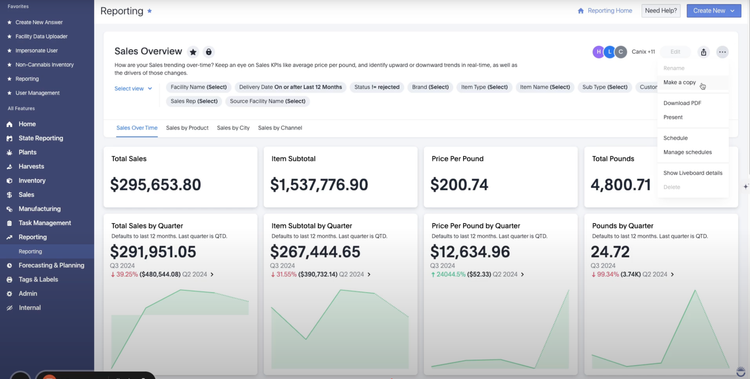
Recommendations for Choosing the Best ERP
Here’s our methodology outlining the key considerations for choosing an ERP system that aligns with your business requirements:
1 Regulatory Compliance and Reporting
- Compliance Features: Ensure the ERP system is equipped with robust compliance management tools to adhere to state and federal regulations.
- Automated Reporting: Look for automated reporting capabilities to streamline regulatory filings and audits.
2 Inventory Management and Traceability
- Seed-to-Sale Tracking: Select a system that offers comprehensive seed-to-sale tracking for complete visibility of the product lifecycle.
- Inventory Control: Evaluate the ERP’s ability to manage inventory levels, product categorization, and batch tracking.
3 Financial Management and Costing
- Accounting Features: Ensure the system provides strong financial management tools, including accounting, budgeting, and cost analysis.
- Tax Compliance: The ERP should facilitate accurate tax calculations and compliance specific to the cannabis industry.
4 Integration Capabilities
- Compatibility with Existing Systems: Check if the ERP can seamlessly integrate with your existing systems, like POS, CRM, or e-commerce platforms.
- APIs and Data Exchange: Assess the availability of APIs for custom integrations as needed.
5 Quality Control and Product Management
- Quality Assurance Tools: Look for features that assist in maintaining product quality and consistency.
- Product Development Support: The ERP should support product development processes, including recipe management for edibles or concentrates.
6 Cost Analysis and ROI
- Cost-Benefit Evaluation: Consider the total cost of ownership, including licensing, implementation, training, and maintenance.
- Return on Investment (ROI): Estimate the potential ROI based on efficiency gains, compliance risk reduction, and growth support.
Key Features
- Seed-to-sale capabilities: This includes cultivation, processing, and manufacturing. Track and automate grow performance and optimize future product yield by monitoring your nutritional cycle closely.
- Traceability: Deep audit and traceability features ensure all sale transactions are legally performed and contain information about the exact type and weight of product sold. They will also include proper inventory control, such as accounting for potential waste and that customers are certified to purchase.
- Regulatory compliance: State regulators want to monitor every step in the supply chain, including where it was planted, harvested, processed, and sold. Strict traceability is a must. Compliance functionalities in cannabis ERP software will review plant and product procedures to ensure compliance. They will also automatically report any compliance data to the state while ensuring reports are created in a compliance-friendly manner.
- Inventory management: Track stock levels of raw materials needed to perform operations and any finished goods awaiting sale. Record weight levels accurately. Track expiration dates or any waste that may come about to ensure no product loss.
- Accounting: Track the income and expenses involved with running your cannabis business. Create financial reports to review profitability and to remain transparent with state officials.
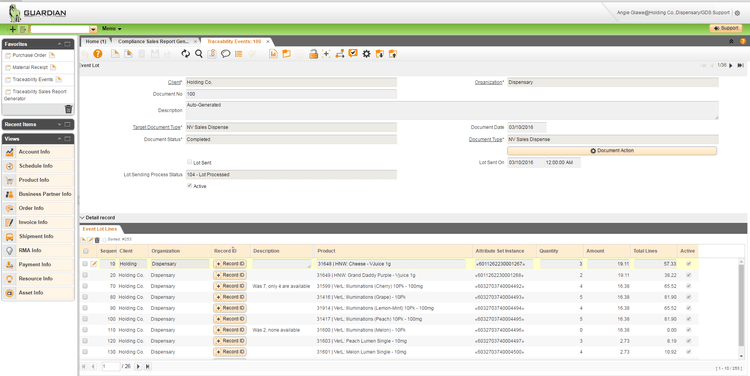
Integration With State-Required Cannabis Software
Cannabis companies will use a seed-to-sale software to meet their cultivation, manufacturing, and processing needs. Every state that has cannabis available for purchase (whether for medical or recreational cannabis) requires businesses to use seed-to-sale tracking software to stay compliant with local or state laws and regulations surrounding the sale of cannabis products.
Due to the legality of cannabis at a federal level, states require all cannabis growers to report strict figures on their sales, their growing process, their inventory levels, and more.
States use their own seed-to-sale software to monitor the compliance of cannabis businesses in their jurisdiction and verify reports received from these businesses. Some solutions are awarded a contract with a state to become the main seed-to-sale solution operated by state authorities.
This does not mean every seed-to-sale business operating in their state must use this software, but using it will give state authorities an easier ability to receive your reporting data.
The following products have been awarded a contract in at least one U.S. state:
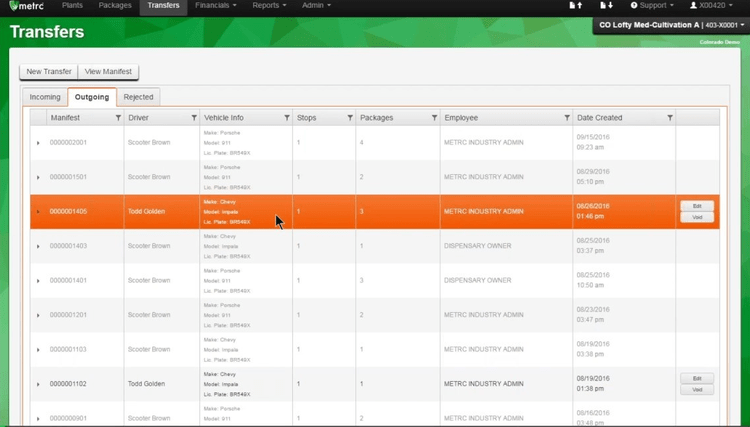
Pricing Guide
Cannabis ERP software can range from $3,000 to over $100,000 a year. Here’s an overview of the general pricing tiers:
-
Low-Tier Pricing ($3,000 - $10,000 per year): Ideal for small-scale dispensaries, boutique growers, or startups just stepping into the cannabis industry. Basic ERP functionalities include simple inventory management, compliance tracking, and financial reporting.
-
Mid-Tier Pricing ($10,000 - $40,000 per year): Geared towards mid-sized cannabis businesses like larger dispensaries, medium-scale growers, and integrated businesses with retail and cultivation arms. Offers more advanced functionalities such as enhanced inventory tracking, compliance management tools, and financial analytics.
-
High-Tier Pricing ($40,000 - $100,000 per year): Suitable for large-scale cultivation operations, multi-location dispensaries, and businesses with extensive distribution networks. Delivers comprehensive features including advanced data analytics, regulatory compliance management, supply chain management, and CRM integrations.
-
Enterprise-Level Pricing ($100,000+ per year): Designed for enterprise-level operations with national or international reach, involving complex, multi-entity structures. Provides highly customizable and scalable platforms, with seed-to-sale tracking, global supply chain management, and detailed compliance management across different jurisdictions.
Frequently Asked Questions
What Is the Difference Between Cannabis ERP Software vs. Seed-to-Sale Software?
The biggest difference between seed-to-sale software and cannabis ERP software is the ability to provide proper financial management and inventory control. Many state-required cannabis solutions will struggle to integrate with outside options, which leaves a desire to a unified (fully-integrated) solution.
Cannabis ERP software acts as the “all-in-one” solution that’s intended to provide seed-to-sale functionality while also including the needed back-office features to run your business smoothly.
Is Cannabis ERP or Seed-to-Sale Software Better For My Business?
As your business grows, so will your need for accurate and compliant financial reporting.
Companies often start out with a seed-to-sale software and use a simple accounting system such as QuickBooks Pro to handle their bookkeeping. Otherwise, they would turn to a generic ERP option that may struggle to remain compliant. Because of this, cannabis businesses have asked for a true cannabis ERP solution to emerge.
Today, cannabis ERP software continues to hit the market as a single source of data for all areas of the business. Traditional seed-to-sale functionality is now integrated with accounting and inventory management, and because it was built with the cannabis industry in mind, the solutions will keep you compliant.











































